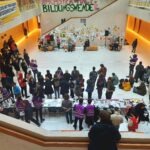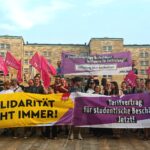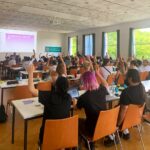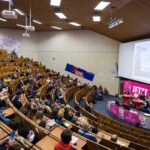How to deal with Covid-19 at Goethe-University – demands of unter_bau
In the span of a few weeks, the Covid-19 pandemic has dramatically changed the lives of millions of people. Already at an early stage of the pandemic it became clear that the health crisis would also have serious political and economic consequences. Especially vulnerable are those workers whose contract is not based on a collective labor agreement. With no entitlement to guaranteed pay, they are likely to face serious economic hardships. Unfortunately, the virus and the resulting economic crisis also represent a major threat to workers and students at university. In recent years, many neoliberal reforms have been implemented at university. Work relations are more and more based on short-term contracts and students are admonished to complete their studies as quickly as possible. Due to such reforms the economic consequences of the virus for students and workers will be even more severe.
The union unter_bau represents all students and employees at Goethe-University, including those working for associated institutes and independent contractors. In a press release on March 13th, 2020 we presented our demands concerning how the university should deal with the virus. Since then, some measures have been taken to provide economic security for employees and to implement social distancing at university. However, this is not enough. Our colleagues and fellow students continue to reach out to us with problems at their workplaces related to the virus. Accordingly, we will continually update our demands and publish them on our website. The most recent version of our demands can be accessed with this link: www.unterbau.org/corona
The following demands must be met:
(Date: 15th April 2020)
1. Extend funding periods for those dependent on third-party funding: In recent years, the number of research projects that are based on third-party funding has increased significantly. The researchers working on those projects are particularly affected by the crisis. In order to receive the promised funds, they must adhere to strict conditions and deadlines. Due to the current shutdown of the university, meeting those deadlines may be impossible.
→ unter_bau calls on the university to approach the institutions who provide third-party funds and ask them to extend the funding period. If this is not possible, affected researchers should be provided financial compensation by the university.
2. Ease requirements of freelance contracts: Researchers and lecturers employed on the basis of freelance contracts also face economic insecurity. Especially so-called private lecturers (Privatdozent*innen) are at risk of suffering disadvantages. Freelancers are only entitled to bear their lecturer titles if they offer a certain number of courses per semester. Due to the current situation they may be unable to fulfill this requirement.
→ unter_bau demands that lecturers get paid for courses that they planned to offer on the basis of freelance contracts even if the courses cannot take place. For private lecturers, strict requirements about teaching courses should be suspended for the time of the crisis.
3. Suspend fixed-term contract employment: Many researchers are temporarily employed in short-term projects. Due to the lockdown of the university, their projects are delayed and deadlines cannot be met. Many colleagues fear that this will have negative consequences for their maximum duration of employment according to WissZeitVG. According to this law, researchers and lecturers who have completed their PhDs, have a limit of maximum 12 years as fixed-term employees.
→ In order to prevent such consequences, fixed-term work contracts must not be issued for the extent of the lockdown. Also, it must be guaranteed that the period during which researchers are not able to finish their projects will not count as official employment according to WissZeitVG.
4. Compensation for online preparations (eLearning): It has been suggested that teachers can adapt to the new situation by using digital resources for their courses. However, this often requires a great deal of extra preparation time and technical support. Many lecturers are unfamiliar with eLearning techniques and fear that the quality of their seminars will suffer in an online format.
→ unter_bau demands that extra preparation time for composing digital courses will be remunerated. In addition, it must be recognized that some courses cannot be taught online and therefore must be suspended.
5. Guaranteed pay for workers of independent contractors: In recent years, many services at university have been outsourced, for example, the catering services at the cafeteria. Even if these colleagues are employed by independent firms, their work is heavily affected by the decisions of the presiding committee. The current situation poses a threat to many of these colleagues, because their companies often engage in poor labor practices, offer little job security, and lack income guarantees.
→ unter_bau calls on the presiding committee to use its purchasing power to ensure that employees of independent contractors working at university continue to receive their wages during the time of the lockdown.
6. Support for precarious workers: The cost of living is disproportionally high in Frankfurt a.M. Because of the high cost of living, in addition to their studies many students have to work in low-paid jobs, for example, as restaurant workers. Most of those jobs have been suspended in the current crisis and thus cannot provide economic security for students.
→ unter_bau demands that the presiding committee call on political decision makers to issue immediate financial support for students and other employees in precarious conditions.
7. Adjustments on semester limits and fees for students affected by exam cancellations: Because of the university lockdown, students currently have limited access to learning resources. The president responded to the situation by cancelling or postponing examinations and deadlines. This, however, may have serious implications for students. Many students will not be able to finish their studies by the time they intended. This delay can lead to financial problems, because some students will not be able to pay fees and living costs.
→ unter_bau demands that the bursar’s office will issue refunds of segregated fees for students who were supposed to finish their studies by 03/31/2020. Examination regulations which currently are going to expire must be extended, so that students do not suffer any disadvantage by suddenly being confronted with new rules. In order to secure funding, BAföG-requirements must be adjusted to the current situation. If the study time is extended due to cancelled or postponed exams, the official number of semesters within which students are supposed to finish their studies must be raised. To the degree that it is not part of the responsibility of the presiding committee to decide on the issues mentioned, the committee should approach the state and federal government for meeting the demands.
8. Flexibility concerning medical student exams and internships: Students enrolled at medical school and especially those currently assisting professional staff in hospitals (“Praktisches Jahr”) are affected by the crisis, because they cannot study according to their course schedule anymore.
→ unter_bau demands that the so-called M1-, M2- and M3-exams are cancelled if they cannot take place due to the current situation. Students should receive an equivalent grade which is based on the average of earlier grades in their studies. Medical students currently working as assistants in hospitals must not suffer any disadvantages, especially with regard to counting sick days as holidays. Concerning cancelled internships, students should have the right to decide whether they repeat the internship at a later point or not. To the degree that it is not part of the responsibility of the presiding committee to decide on the issues mentioned, the committee should approach the state and federal government for meeting the demands of medical students.
9. Adjustments to accomodate international Students: The novel coronavirus crisis poses a threat to international students. Some of those students come from countries which are even more affected by the virus than Germany. International students risk losing their residency permit if the summer term does not count as a regular semester.
→ unter_bau calls on the presiding committee to take into account legal consequences for international students when deciding on guidelines for the upcoming semester. Information concerning international students should be available in different languages and at the very least, must be available in English.
10. Flexibility for workers with caregiving responsibilities: Workers who have to take care for children or elderly people currently face serious challenges in their daily lives because kindergartens and schools are closed.
→ unter_bau demands that workers engaged in care work do not have mandatory attendance at their workplace. Workers who have to stay at home because of family-related tasks and duties must not face economic disadvantages. Therefore, they must not be forced to take unpaid or regular holidays in order to fulfill those tasks. Also, supervisors must recognize that workers who have to take care for children while working at home are not able to show the same results as other colleagues. Doctors and nurses working at the hospital run by the university must be offered child-care facilities, so that they can continue working if they choose to.
11. Intensify workplace hygiene measures: Despite the recent measures to implement social distancing the university is one of the spaces where the virus can spread.
→ unter_bau calls on the presiding committee to intensify measures that facilitate individual and collective hygiene. All sanitary facilities must be provided with sufficient supplies of soap and germicide.
What next – democratic decision making in times of crisis
Last week, the presiding committee declared that the spring semester will be a “semester of emergency” and presented its measures. The libraries and cafeterias will remain closed, courses can only be taught online, written exams will not be possible, etc. We appreciate that the presiding committee affirmed some of our demands, for example by supporting the state and federal policy of extending the regular period of study for one semester. However, it is also clear that this cannot be the final decision on how to counter the crisis and its negative effects. Given the far-reaching consequences of those decisions for students and employees, it is more important than ever that all stakeholders are involved in decision making processes.
The crisis we are now witnessing is also the result of neoliberal policies that have been enforced within the last 20 years. Workers and researchers have to a growing extent been employed on a short-term basis, services that are indispensable for university life have been outsourced and the everyday life of a student more and more resembles the life in high school. Neoliberal reforms are deeply implicated in the insecurity and economic hardships that many employees now face. If we do not question those reforms, our efforts to counter the crisis will remain halfhearted. The current crisis also presents democratic opportunities – but only if we are willing to change the fundamental structures that intensify its effects. It will only be an opportunity if our efforts to overcome it are guided by true solidarity and serious democratic commitment. Now is the time to implement a basic democratic principle that has long been demanded by unter_bau: decisions need to be decided by those most affected by them – across all companies and institutions.







